
A conductor or guard is a train crew member responsible for operational and safety duties that do not involve actual operation of the train/locomotive. The conductor title is most common in North American railway operations, but the role is common worldwide under various job titles. In Commonwealth English, a conductor is also known as guard or train manager.

A bus stop is a place where buses stop for passengers to get on and off the bus. The construction of bus stops tends to reflect the level of usage, where stops at busy locations may have shelters, seating, and possibly electronic passenger information systems; less busy stops may use a simple pole and flag to mark the location. Bus stops are, in some locations, clustered together into transport hubs allowing interchange between routes from nearby stops and with other public transport modes to maximise convenience.

A garbage truck is a truck specially designed to collect municipal solid waste and transport it to a solid waste treatment facility, such as a landfill, recycling center or transfer station. In Australia they are commonly called rubbish trucks, or garbage trucks, while in the U.K. dustbin lorry, rubbish lorry or bin lorry is commonly used. Other common names for this type of truck include trash truck in the United States, and refuse truck, dustcart, junk truck, bin wagon or bin van elsewhere. Technical names include waste collection vehicle and refuse collection vehicle (RCV). These trucks are a common sight in most urban areas.
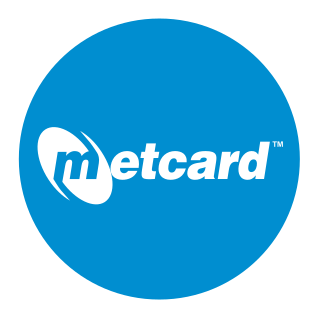
Metcard was the brand name of an integrated ticketing system used to access public transport in Melbourne, Australia. It was a universal ticket which allowed users to ride on the city's Metlink and Metropolitan Transit Authority network, consisting of suburban trains, trams, and buses, including the NightRider network. The Metcard was a credit card-sized ticket made out of cardboard and used a magnetic strip to store fare data. Metcard was operated by OneLink Transit Systems under a contract with the Government of Victoria which was managed by the Transport Ticketing Authority.
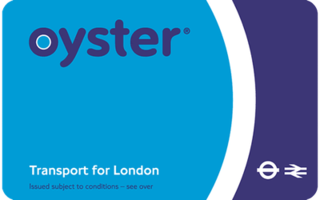
The Oyster card is a payment method for public transport in London, England, United Kingdom. A standard Oyster card is a blue credit-card-sized stored-value contactless smart card. It is promoted by Transport for London (TfL) and can be used on travel modes across London including London Buses, London Underground, the Docklands Light Railway (DLR), London Overground, Tramlink, some river boat services, and most National Rail services within the London fare zones. Since its introduction in June 2003, more than 86 million cards have been used.

A ticket machine, also known as a ticket vending machine (TVM), is a vending machine that produces paper or electronic tickets, or recharges a stored-value card or smart card or the user's mobile wallet, typically on a smartphone. For instance, ticket machines dispense train tickets at railway stations, transit tickets at metro stations and tram tickets at some tram stops and in some trams. Token machines may dispense the ticket in the form of a token which has the same function as a paper or electronic ticket. The typical transaction consists of a user using the display interface to select the type and quantity of tickets and then choosing a payment method of either cash, credit/debit card or smartcard. The ticket(s) are then printed on paper and dispensed to the user, or loaded onto the user's smartcard or smartphone.

An exit fare is a method of collecting ridership fees, or fares, from a transportation system, where the fee is collected from passengers upon reaching their destination.
A currency detector or currency validator is a device that determines whether notes or coins are genuine or counterfeit. These devices are used in a wide range of automated machines, such as retail kiosks, supermarket self checkout machines, arcade gaming machines, payphones, launderette washing machines, car park ticket machines, automatic fare collection machines, public transport ticket machines, and vending machines.

Proof-of-payment(POP) or proof-of-fare(POF) is an honor-based fare collection system used on many public transportation systems. Instead of checking each passenger as they enter a fare control zone, passengers are required to carry a paper ticket, transit pass, transit smartcard - or open payment methods such as contactless credit or debit cards (if applicable) - after swiping or tapping on smart card readers, to prove that they have paid the valid fare. Fares are enforced via random spot-checks by inspectors such as conductors or enforcement officers, to ensure that passengers have paid their fares and are not committing fare evasion. On many systems, a passenger can purchase a single-use ticket or multi-use pass at any time in advance, but must insert the ticket or pass into a validation machine immediately before use. Validation machines in stations or on board vehicles time stamp the ticket. The ticket is then valid for some period of time after the stamped time.

A bus conductor is a person responsible for collecting fares from bus passengers. Bus conductors may also be responsible for helping passengers to board, keeping the bus route on schedule, attracting potential passengers to the vehicle, and announcing bus stops.
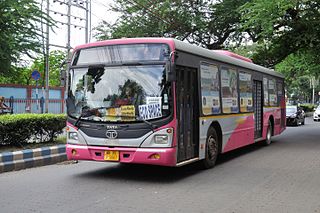
The transport system of Kolkata, a city in India, is a mix of modern mass rapid transport and old transport modalities like rickshaws. Kolkata is connected to the rest of India by the National Highways, the extensive network of the Indian Railways, National Waterways and by air. The most traffic to Northeast India route is via Kolkata.

Automated cash handling refers to the process of dispensing, counting, and tracking cash within various business environments using software and hardware devices such as banknote processing. Automated cash handling is used by banks, retail stores, check-cashing outlets, payday loan/advance providers, casinos, and more. This process is facilitated through the use of specially designed hardware and software, with the primary goals of preventing loss, deterring theft, and reducing the need for constant manual oversight of cash operations.
Public transport ticketing in New South Wales, Australia operated using magnetic-stripe technology between 1989 and 2016. This ticketing system, known variously as the Automated fare collection system, STATS and, from 2010, MyZone, was progressively replaced by a contactless smart card called Opal between 2012 and 2016.
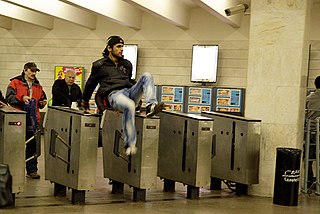
Fare evasion or fare dodging is the act of travel without payment on public transit. When considered problematic, it is mitigated by revenue protection officers and ticket barriers, staffed or automatic, are in place to ensure only those with valid tickets may access the transport. The term fare avoidance is sometimes used as a euphemistic synonym and sometimes used to refer to the lawful use of much cheaper tickets.

Bangkok Mass Transit Authority, also known as BMTA, is the main operator of public transit buses within the Greater Bangkok area. It is the largest city bus system in Thailand. The Bangkok Mass Transit Authority offers bus and van routes throughout the city and its suburban provinces.
A penalty fare, standard fare, or fixed penalty notice is a special, usually higher, fare charged because a passenger using public transport did not comply with the normal ticket purchasing rules. It should not be confused with an unpaid fares notice.

The New Routemaster, originally referred to as the New Bus for London and colloquially as the Borismaster or Boris Bus, is a low-floor diesel double-decker bus operated in London, England. Designed by Heatherwick Studio and manufactured by Wrightbus, it is notable for featuring a "hop-on hop-off" rear open platform similar to the original Routemaster bus design but updated to meet requirements for modern buses to be fully accessible. It first entered service in February 2012 with Arriva London on London Buses route 38.
A fare is the fee paid by a passenger for use of a public transport system: rail, bus, taxi, etc. In the case of air transport, the term airfare is often used. Fare structure is the system set up to determine how much is to be paid by various passengers using a transit vehicle at any given time. A linked trip is a trip from the origin to the destination on the transit system. Even if a passenger must make several transfers during a journey, the trip is counted as one linked trip on the system.
The Bus Reshaping Plan of 1966 was a plan devised by the London Transport Board for the reorganisation of bus routes in London, England. The main features of the plan, which was to be rolled out over ten to fifteen years, were:
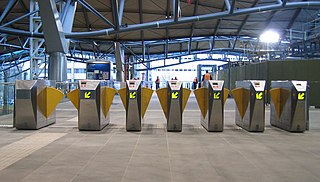
An automated fare collection (AFC) system is the collection of components that automate the ticketing system of a public transportation network – an automated version of manual fare collection. An AFC system is usually the basis for integrated ticketing.

















